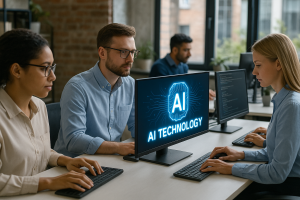 SAP, one of the world’s leading providers of enterprise software, is making significant strides in artificial intelligence (AI) and machine learning (ML). These technologies are no longer buzzwords—they’re integral to how modern businesses operate. SAP is embedding AI and ML across its platforms to help companies run more efficiently, make smarter decisions, and respond faster to changing conditions.
SAP, one of the world’s leading providers of enterprise software, is making significant strides in artificial intelligence (AI) and machine learning (ML). These technologies are no longer buzzwords—they’re integral to how modern businesses operate. SAP is embedding AI and ML across its platforms to help companies run more efficiently, make smarter decisions, and respond faster to changing conditions.
Embedding AI into the Core of Business Processes
SAP isn’t building a separate AI tool that companies need to integrate on their own. Instead, it’s weaving AI directly into the workflows and processes inside applications like SAP S/4HANA, SAP SuccessFactors, and SAP Ariba. The goal is to make AI invisible but essential, working behind the scenes to analyze data, predict outcomes, and automate tasks. Through Accely partner benefits, businesses can maximize the value of these AI-enhanced applications with expert support, faster deployment, and tailored optimization.
For example, in SAP S/4HANA, AI can predict late payments, identify duplicate invoices, and automate financial reconciliations. In human resources, SAP SuccessFactors utilizes machine learning to enhance recruiting, identify bias in job descriptions, and suggest learning paths for employees. In procurement, SAP Ariba leverages AI to identify contract risks, flag potential supply chain disruptions, and negotiate more favorable terms with suppliers.
These features aren’t add-ons—they’re part of the core user experience, designed to help users take action quickly with better context and fewer manual steps.
Business AI That’s Industry-Specific
One of SAP’s key advantages is its in-depth understanding of industry processes. SAP isn’t building generic AI. It’s building what it calls “Business AI”—tailored to specific use cases in industries like manufacturing, retail, healthcare, and logistics.
In manufacturing, for example, SAP utilizes machine learning to optimize production schedules, minimize downtime, and identify quality issues before they escalate. For retail, AI helps manage inventory more accurately and personalize marketing based on buying behavior. These aren’t just nice-to-have tools—they solve real business problems that affect the bottom line.
SAP also pulls from a massive amount of industry data. Its cloud solutions touch nearly every part of a company’s operations, from finance to supply chain. That gives its AI models a broad and deep pool of structured data to learn from—something smaller AI vendors can’t match.
Responsible and Explainable AI
With growing concerns around bias, privacy, and transparency in AI, SAP has been vocal about the need for “responsible AI.” It has built guardrails into its AI offerings to ensure fairness, traceability, and accountability.
SAP’s AI systems are designed to be explainable. That means users can understand why a recommendation was made or how a prediction was calculated. This transparency is especially important in areas such as hiring, finance, and compliance, where decisions carry significant legal or ethical implications.
The company also follows strict data privacy and governance standards. SAP’s AI doesn’t train on a customer’s data unless the customer agrees. And when it does, that data stays protected under enterprise-grade security.
Integration with SAP Business Technology Platform (BTP)
At the heart of SAP’s AI strategy is the SAP Business Technology Platform (BTP). This is where developers can build, extend, and integrate applications using SAP’s AI and ML services.
Through BTP, companies can leverage pre-trained models or develop their own. SAP also offers AI Core and AI Foundation, tools that let organizations manage their machine learning lifecycles—from training to deployment to monitoring.
One standout feature is SAP’s support for bringing in external ML models. Businesses that have built their own AI models using frameworks like TensorFlow or PyTorch can integrate them with SAP applications using BTP. This flexibility enables businesses to maximize the value of their existing investments while still reaping the benefits of SAP’s comprehensive integration.
Partnering with Leaders in AI
SAP knows it doesn’t have to build everything in-house. It’s partnering with AI leaders like Microsoft, Google Cloud, and NVIDIA to deliver more advanced capabilities to customers more quickly.
For example, SAP and Microsoft have partnered to bring SAP applications to Microsoft Azure, enabling improved scalability and integration with Microsoft’s AI services. SAP is also collaborating with NVIDIA to integrate high-performance AI computing into its data platforms, thereby accelerating tasks such as predictive analytics and real-time simulation.
These partnerships enable SAP to stay at the forefront of AI innovation while maintaining focus on its core business software strengths.
Real-World Examples
AI and ML aren’t just future ideas for SAP—they’re already delivering results.
A major consumer goods company used SAP’s machine learning in S/4HANA to reduce errors in invoice matching by over 90%, saving time and reducing manual effort. A logistics provider utilized AI to predict equipment failures and schedule proactive maintenance, resulting in a nearly 40% reduction in downtime. In HR, a global manufacturer utilized SAP SuccessFactors’ AI tools to enhance internal mobility, resulting in a 15% increase in employee retention.
These aren’t isolated wins—they show how embedded AI in business processes can drive measurable value.
Looking Ahead
SAP’s AI vision is centered on practical, enterprise-grade solutions. It’s not trying to compete with consumer-facing AI tools or chase headlines. Instead, it’s focused on making AI a seamless and trusted part of how businesses operate every day.
The company continues to invest in expanding its AI capabilities, both through internal development and external partnerships. As generative AI matures, SAP is exploring ways to bring these tools into its ecosystem, always with a focus on transparency, security, and real-world business outcomes.
For companies already using SAP or considering a move to the SAP ecosystem, AI and machine learning aren’t optional extras. They’re becoming standard, built-in capabilities that drive smarter decisions, better outcomes, and more resilient operations.
